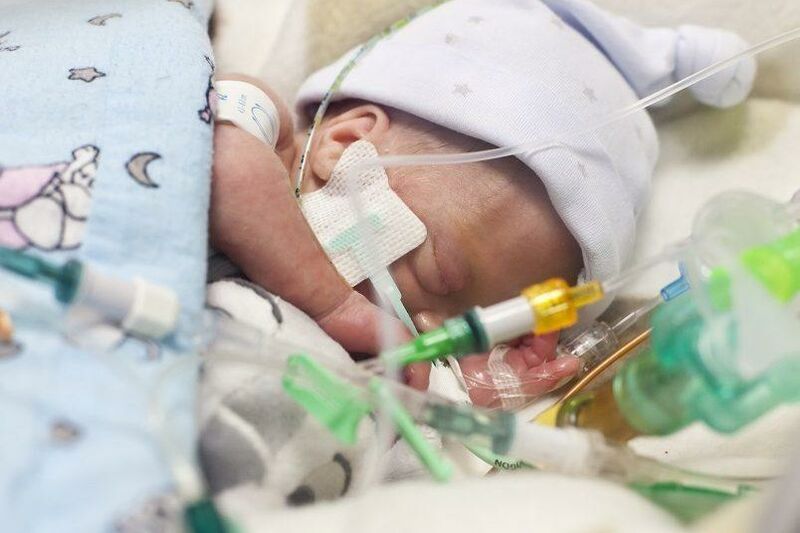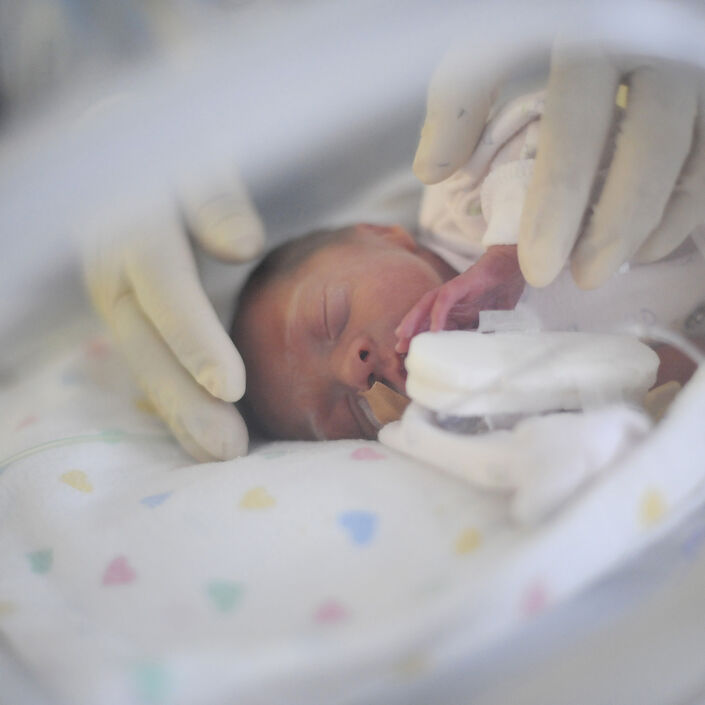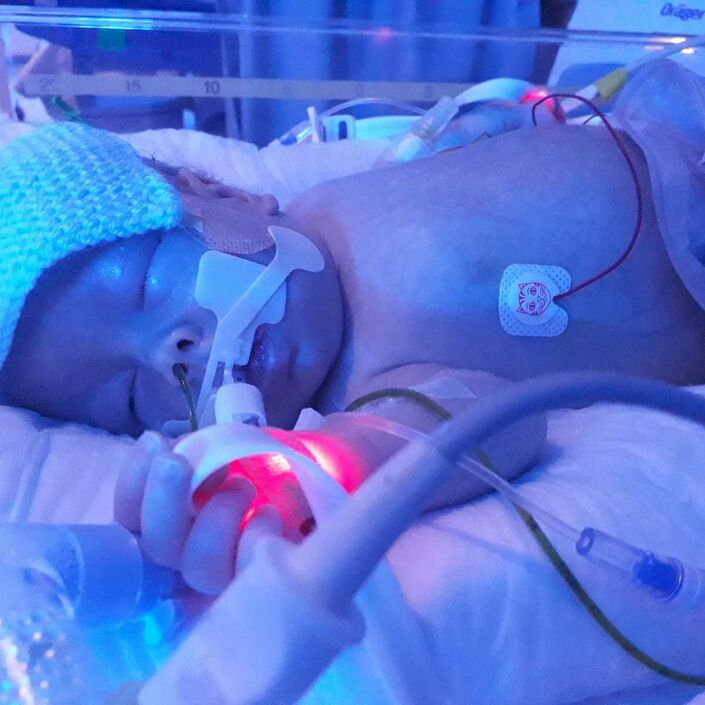You can find detailed information about necrotising enterocolitis (NEC) on our website, including what the condition is and the signs to look out for in your baby.
What will happen during surgery to treat NEC?
Not all babies with NEC need surgery. Those that do will have a laparotomy.
A laparotomy allows the surgeon to look at the bowel by making a hole across the tummy. Your baby will be put under general anaesthetic (put to sleep) for a laparotomy. The surgeons will explain what they plan to do before surgery and talk about the procedure with you.
During a laparotomy, the surgeon will try to remove the dead bowel and may rejoin the two healthy ends together. If it is not possible to rejoin the two ends at the time of surgery, the surgeon may create a stoma.
Rarely, your baby may need a second operation within 48 hours to assess the bowel properly and decide on treatment.
If your baby needs surgery for NEC, or if healthcare professionals feel that they might need surgery later, then they will need to be moved to a neonatal unit that specialises in neonatal surgery. For more information about this, you can visit our pages on hospital transfers.
What is a stoma?
A stoma is where the bowel is brought out onto the skin of your baby’s tummy. This then allows the bowel to open with poo passing into a small bag that is placed on the outside of your baby’s body.
A stoma can help your baby recover from NEC and grow. When your baby has recovered, the bowel can be rejoined by the surgeon and the stoma can be removed.
How is a stoma looked after?
Your baby’s stoma and the skin around it needs special care. Stomas can make the skin red or sore around the opening and there can be leakage. The stoma may also occasionally bleed when touched. Although this might sound scary, this is not harmful or painful for your baby.
Specialist nurses will work with you and show you how to take care of the stoma so that the skin around it is healthy and free of infection.
What can go wrong with a stoma?
Sometimes there can be problems with stomas. This may include the following:
- the stoma may not work properly because of a blockage and surgeons may need to look at it.
- the bowel attached to the stoma can start to slip back into the tummy through the hole, making it difficult to change the bag. If this happens, your baby may need more surgery.
- more of the bowel may come out of the baby’s tummy. This is called a stoma prolapse, and your baby may need more surgery.
- your baby may lose more salt than normal. If this happens, your baby will need to be given more salt in their diet. Your healthcare professional will explain this to you.
If your baby goes home with a stoma, a community neonatal nurse will support you at home.
What are the risks of surgery to treat NEC?
Every surgery carries risk, especially if your baby is very sick. The success of surgery for NEC can depend on many things, such as your baby’s general health, and how much NEC has affected them.
The healthcare professionals involved in your baby’s care should explain any risks to you. You can ask them questions and talk to them about your concerns.
What may happen after surgery to treat NEC?
Your baby will most likely:
- be given pain relief
- be given antibiotics
- be closely watched, and attached to monitors
- be connected to a ventilator to help with breathing
- need extra medicines to support their circulation
- have some time when their gut will be rested, and will be fed nutrients using a long line.
Your baby may also need blood transfusions and other medications.
Usually a stoma works and your baby will be able to start taking milk that’s absorbed by the bowel.
When will my baby start milk feeds again after surgery for NEC?
Babies respond to treatment for NEC differently. Most babies who have surgery need to be treated for around 14 days. After this, your baby should be able to take small amounts of milk. This can be slowly increased until your baby is taking enough milk to grow well.
Talk to the healthcare professionals looking after your baby about when it is best to start to feed your baby again.
Babies recover from NEC best if they have their own mother’s breast milk. While your baby is unwell and not taking milk, you should keep expressing your milk, if you are able. This will help maintain your milk supply and also give you a store that can be used later.
Ask your healthcare professional how you can safely store your milk. Sometimes parents need to use a specially prepared formula milk that is easier for your baby to digest.
Some babies with stomas are unable to absorb enough nutrition from milk. If this happens, your baby will continue to be fed through a long line until the bowel is rejoined and the stoma is closed.
When your baby is feeding and is well enough, you should be able to breastfeed. Talk to a healthcare professional if you need help with breastfeeding or expressing your milk. We have more information about feeding that you may find helpful.
What might happen long-term after my baby's surgery for NEC?
Many babies recover well from NEC, but it is possible that other problems may develop, especially if your baby has had surgery. These can include the following:
- NEC coming back (recurrent NEC). If this happens, your baby may need more surgery.
- the wound from surgery becoming infected or breaking down. This may need treatment with antibiotics and extra sutures (stitches). It may cause a larger scar on the skin.
- strictures, which is where the bowel narrows because of scar tissue. This can be caused by damage to the bowel from NEC, or from surgery to treat NEC. If this happens, your baby will need more surgery to widen the restricted area of the bowel or possibly remove the narrow area.
- short bowel syndrome, which is where your baby may have problems with absorbing food if a lot of bowel has been removed. This can affect how your baby grows. If your baby has short bowel syndrome, your baby will need to be given nutrition intravenously (through a vein) for a long time.
Your baby may need more surgery if problems continue.
In the long term, research shows that NEC can have an impact on how some babies’ brains develop, but all babies develop differently and your baby’s development will be regularly assessed and monitored by healthcare professionals.
This team could include consultants neonatologists, nurses, dieticians, paediatricians and occupational therapists. Speak with them about any concerns you have about your baby’s growth.



